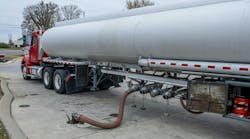Safety advocates and stakeholders in the trucking industry are readying for another court battle—this time over the revised hours of service (HOS) rule that went into effect in 2005.
The American Trucking Assns. (ATA) has recently filed a motion to intervene in response to a petition to review the 2005 rule filed in the U.S. Court of Appeals for the District of Columbia Circuit by Public Citizen, Citizens for Reliable and Safe Highways (CRASH), Parents Against Tired Truckers (PATT), Advocates for Highway and Auto Safety, and the International Brotherhood of Teamsters.
Safety opponents to the rule are essentially seeking a reduction in drivable hours. In a statement issued by Public Citizen, the advocacy group chided Federal Motor Carrier Administration (FMCSA)—the government agency that issued the rule—for increasing the number of drivable hours from 10 hours to 11 each work day in both the 2003 rule and the revised 2005 version.
In addition, safety advocates are also likely to challenge other aspects of HOS, including the 34-hour restart, the absence of an electronic onboard recorder (EOBR) mandate, and inadequate consideration of drivers’ health issues.
ATA expects the Court briefing will be scheduled this summer, with oral arguments in the fall, and a final decision in about one year.
Public Citizen, which spearheaded the HOS challenge on the basis of safety, filed the court challenge on Feb. 27 after withdrawing its petition with FMCSA to reconsider the 2005 rule. Public Citizen filed its petition for reconsideration on Sept. 23 and withdrew it Feb. 21 when FMCSA had not yet issued a response.
Public Citizen, along with CRASH and PATT, challenged the 2003 rule and the U.S. Court of Appeals for the District of Columbia Circuit vacated the rule on July 2004 because FMCSA had failed to fulfill its statutory requirement to consider the rule’s effect on drivers’ health. Congress stepped in to temporarily extend the 2003 rule until the agency addresses the Court ruling.
On August 2005, FMCSA Administrator Annette Sandberg announced the revised rule, which made a provision to split daily 10-hour off-duty less flexible, but maintained the 11 hours of drivable hours. In addition, the agency addressed drivers’ health with research that essentially supports the 2003 rule.
“The court vacated the [2003] rule based on driver health, and driver health only,” FMCSA Administrator Annette Sandberg said upon announcing the rule in August. In developing the new rule, she said FMCSA “addressed driver health issue very extensively. We believe we had the science and the data [to support the 2003 rule] to begin with. That's what we said during the court case, and the court wanted us to provide it in a more thorough manner.”
See FMCSA’s Sandberg presents new HOS.
In a separate but related lawsuit, the Owner-Operator Independent Drivers Assn. (OOIDA) in January challenged the revised rule on the basis that the off-duty split provision is unfair. OOIDA, along with International Brotherhood of Teamsters, Truckload Carriers Assn., and both the Ohio and California Trucking Assns. are seeking a Court mandate to revert the off-duty split provision back to that of the more-flexible 2003 rule.




